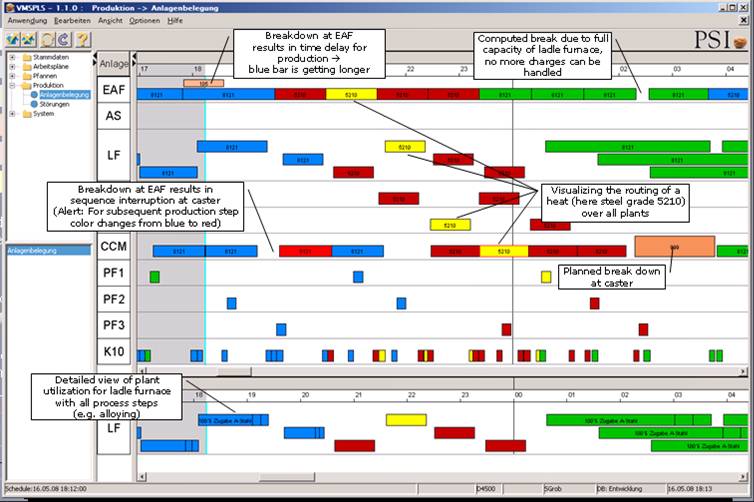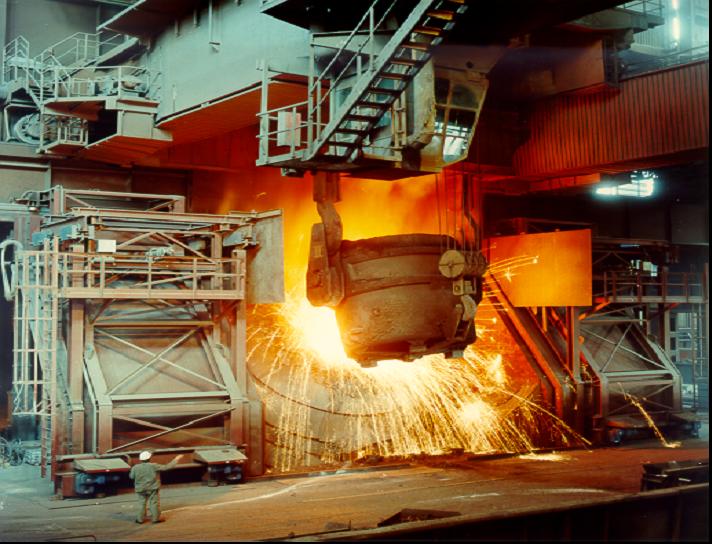Quality assurance and profitability in steel plants
The PSImetals production execution system combines qualitative and economic aspects of process control, and its comprehensive standard and ex-tensions from customer projects in the last few years offer different approaches for quality assurance in a steel plant.
Heinz-Josef Ponten, Manager Steel Making
The steel plant is at the start of the process chain when it comes to manufacturing steel. The composition of the steel is determined here, and its subsequent characteristics are specified. When up to 300 tons of high-grade material is treated in a steel ladle, a deviation of only a few kilograms in the alloying can make the difference between good and poor quality. The importance of the topic of quality can be seen in the demands for a high degree of process certainty from the perspective of the metallurgists as well as from the quality standards and proof required by the customers. The PSImetals production execution system combines qualitative and economic aspects of process control, and its comprehensive standard and ex-tensions from customer projects in the last few years offer different approaches for quality assurance in a steel plant.
The production of complex steel qualities requires a high degree of process control, precise op-erator control as well as immediate response to changes and interferences during production. PSImetals meets these demands, as the production process is precisely modeled and the techno-logical knowhow for each process step is stored in the system. The treatment practices are at the centre: All process steps necessary for the production of a steel grade (e. g. charging, main blow-ing, deoxidizing, alloying, temperature measurement and sampling etc.) are stored in the form of a set of regulations, together with the associated aim values (analysis to be set, temperature, mate-rial restrictions, stirring durations etc.). All target values and regulations can be configured by the user. For actual process control, these values and regulations are transferred to sub layered sys-tems as aim values and displayed to the operating personnel in the pulpits in the form of detailed work instructions. This procedure allows for standardization of all factors affecting the quality of a steel grade and for control of these factors by means of online monitoring and online feedback during treatments. The main target in the planning of casting sequences is the continuous supply of steel to the continuous casting systems, at the precise time and in the required grade and tem-perature. The online heat scheduler of PSImetals takes over the operative planning of the heats at the different facilities on the production route to the casting machine while taking into considera-tion the current production situation at all facilities and the required resources such as ladles and cranes.
Process optimization with mathematical models are used to calculate the best possible sequence and production route for the heats in a sequence, based on planning restrictions (facility proper-ties, treatment duration, resource availability etc.) and current facility situations (process steps al-ready started with plan data in terms of completion, facility downtimes, repair times). This plan-ning is constantly updated by means of online feedback from the process. In this manner, conflict situations can be recognized in advance and are graphically visualized. This allows for online modifications to the schedule by means of automatic exploitation of the given tolerances, for ex-ample by selection of alternative facilities, modifications to the buffer times or casting speed. Thanks to the integration of the online heat scheduler and the line sequencing in PSImetals, it is possible to realize goals such as throughput optimization, coordination of bottleneck facilities, and consideration of ladle availability as well as energy usage optimization in close association with quality goals. Economic optimization of production processes in the steel plant can also only occur where qualitative aspects are taken into consideration. From a procedural point of view, the goal is cost-optimized use of all materials such as scrap, alloys and additions while at the same time ensuring the quality of the steel grade. The charge and alloying optimization of PSImetals ensures that all input materials in the steel plant are optimized for costs and quality. For every steel grade to be produced, the material types and quantities are optimally calculated taken into consideration material restrictions, handling specifications and other ancillary conditions. All ma-terials required are checked for availability in the stocks. The integrated check for analytical reli-ability makes allowance for the fact that delivery-based deviations in material composition do not lead to quality problems when manufacturing high-quality grades. The benefits arising from the application of charge and alloying optimization include optimized usage and alloying costs, im-proved reliability of analysis and a greater transparency in the optimization results by means of visualization of all restrictions.

Online Scheduling of heats with PSImetals (Photo: PSI Business Technology)
To be able to qualitatively control the production of steel from a metallurgical point of view, and to optimize it taking energetic factors into account, metallurgical-thermal process models from PSI partner VDEh-Betriebsforschungsinstitut are integrated into PSImetals. As a result, the dy-namic process control calculates
the current processing status e.g. for electric steel production (temperature, weight, steel and slag analysis) and controls the electrical and chemical energy supply.
the current processing status e.g. for electric steel production (temperature, weight, steel and slag analysis) and controls the electrical and chemical energy supply.
Additional models for dynamic process control of BOF steel plants as well as for facility span-ning process control in secondary metallurgy are available for setting required target values. The models are optimally adapted to PSImetals treatment practices and use the specifications defined there for analysis and temperature as well as the stored restrictions and regulations. In this manner, it is ensured that the technological know-how necessary for process control and specialist knowl-edge are centrally maintained at one location in PSImetals. Customers also profit directly from innovative model approaches derived from research projects when process models are included in PSImetals.
It is only the complete integration of PSImetals, process models and system automation – from scrap-yard right through to the casting machines – that allows for total process control from a qualitative and economic point of view. Whether it be standardized process specifications, model-based process control, online monitoring of deviations in a running production process, or taking into account documented experience values for steel qualities to be newly created – quality prob-lems can be recognized early and charges qualitatively controlled, thanks to the overall process view. This ensures that a heat that has been transferred to the caster has optimally reached the de-fined standard of quality.
PSImetals in its standard configuration includes production management solutions for the entire supply chain in a steel plant, from the scrap-yard via BOF, electric arc furnace, secondary metal-lurgy and casters right up to remelting facilities.

Process optimisation at steel plant with PSImetals (Photo: PSI Business Technology)
Since the beginning of 2007 PSImetals has been used in the meltshop at voestalpine Stahl GmbH. What has been your experience?
"With a current annual production of more than 5.1 million tons, LD-steel plant No 3 produces over 32 000 heats with over 300 different steel grades per year. A high degree of process control in production is a decisive factor in modern, complex steel quali-ties. This can only be achieved if all required process steps are transparently represented and production can respond immediately to changes and interferences during production. To this end, a new system for computer-aided quality control based on the PSImetals production management solution from PSI was successfully commissioned for primary steel production and secondary metallurgy at the beginning of 2007. The main tasks and advantages of this new CAQC-SM are uality assurance by standardization of production of all steel grades, online quality monitoring during production by target-actual comparisons and online adaptation of procedure regulations, online feedback to the operator on current quality and determination of the treatment steps still required. CAQC-SM consequently forms the new kernel of process execution technology in the steel plant.
For example, we were able to reduce recasting as a result of analytical deviations by half. The reliability of PSImetals in daily use (99.96 % system availability) is extremely important to us".
Joachim Lehner,
Process engineer for smelting metallurgy, voestalpine
Process engineer for smelting metallurgy, voestalpine
PSI Business Technology for Industries GmbH is Germany‘s leader for software solutions in production management for the metals industry. Customer relationships established over the course of decades and a host of MES projects have contributed to our staff‘s outstanding techno-logical expertise in metals.
World-wide metals production is growing – and so are we. We are involved when our customers produce at various international sites. Headquarters are located in Düsseldorf and we have an ad-ditional office in Berlin. PSI BT operates its own subsidiary in China to serve the Chinese steel market. PSI China has activities in Shanghai and Beijing. Our global business also benefits from the infrastructure and locations of the PSI Group.








